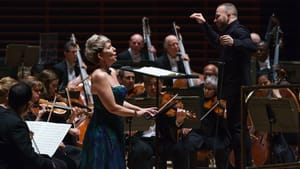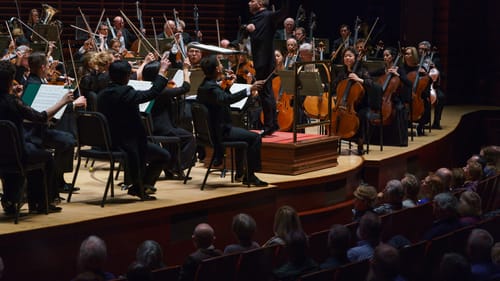Stay in the Loop
BSR publishes on a weekly schedule, with an email newsletter every Wednesday and Thursday morning. There’s no paywall, and subscribing is always free.
Music from the Champs-Élysées to the Parkway
Philadelphia Orchestra presents Nézet-Séguin and DiDonato

Joyce DiDonato makes her subscription-series debut with the Philadelphia Orchestra this week in Chausson’s Poème de l’amour et de la mer (Poem of Love and the Sea), but the acclaimed mezzo-soprano’s association with the City of Brotherly Love extends far beyond these performances.
DiDonato came into her own as an artist while studying at the Academy of Vocal Arts, just a few blocks up Spruce Street from the Kimmel Center’s Verizon Hall. In the ensuing two decades since her days as a resident artist, she has become one of the most sought-after singers on the international stage — and a favorite collaborator of music director Yannick Nézet-Séguin, who presides over these performances.
Style à la mode
Chausson’s composition for voice and orchestra, premiered in 1890, is something of a specialty piece, adored by connoisseurs who think it epitomizes French elegance. To my ears, its monochrome textures capture none of the thrills in a more exciting cycle, such as Berlioz’s Mort de Cléopatre or Ravel’s Shéhérazade.
Thankfully, DiDonato brings intelligence and wit to her performance of the cycle. Despite overreliance on a music stand, suggesting a recent mastery of the score, the mezzo sings with an impeccable ear for the French language. This proves a blessing in light of the laughably inept program translations.
French music often calls for a creamy, rounded tone, far from the natural reediness of DiDonato’s highly placed voice. Although I sometimes wanted more resonance in the lower register, the lack of plushness actually works to strengthen her interpretation, making her delivery less about strictly beautiful sound and more about expressive, well-enunciated connection to the text.
The value of her interpretation particularly shines as the opening “La fleur des eaux” (“The flower of the waters”) moves from hopeful erotic longing to plaintive resignation, leading into the tragic “La mort de l’amour” (“The death of love”). DiDonato largely eschewed vibrato on opening night, complementing the anguish expressed by the poem’s speaker.
Nézet-Séguin proves a supportive partner throughout, underscoring erotic sonorities recalling the Wagner of Tristan und Isolde and the music of Chausson’s great friend, Claude Debussy. It was a performance of great style and panache, one that far exceeded the material.

Local composer
Beyond the Chausson, the orchestra offered an intriguing potpourri of musical styles. The concert began with a stirring reading of the Prelude to Act I of Wagner’s Lohengrin, requiring the full force of the band’s resources. Nézet-Séguin has shown an interest in the German composer’s music in recent years, conducting Parsifal and Der Fliegende Holländer at the Metropolitan Opera.
The elegant opening measures for violin displayed the strings section at the height of its abilities, matched by whispering flutes suggesting a rising sun. The wonderfully restrained beginning built to a throbbing crescendo over the course of eight minutes, with crashing symbols and explosive brass quickening the audience’s collective pulse. Even removed from its position as a gateway to Wagner’s world of Teutonic knights and knaves, the composition articulates all the best qualities of the composer’s musical language.
A composer whose musical language is still in flux is Mason Bates, a 41-year-old Philadelphia native whose work Nézet-Séguin has championed. The first half of the program closed with the local premiere of his Anthology of Fantastic Zoology, composed for the Chicago Symphony Orchestra in 2014.
Bates is largely known for incorporating electronic music into traditional symphonic structure, but Zoology features no automated bells and whistles. Instead, it uses a full-court press of percussion to create an eerie, animalistic sound world recalling Saint-Saëns’s Carnival of the Animals and Sir James MacMillan’s Scotch Bestiary.
At 30 minutes, the piece feels overlong, with many interesting themes overstated or repeated. It can also resemble the self-conscious score of a horror movie. Still, Nézet-Séguin paced with conviction and forcefulness. At its conclusion, he invited Bates onstage to rapturous applause.
The program also featured Respighi’s Fountains of Rome, in a surprisingly soporific reading, for a guaranteed crowdpleaser. But DiDonato’s debut was the news. Let’s hope Philadelphia, once her adopted hometown, gets another visit soon.
What, When, Where
Nézet-Séguin and DiDonato. Yannick Nézet-Séguin, conductor; Joyce DiDonato, mezzo-soprano. Wagner, Prelude to Act I of Lohengrin; Bates, Anthology of Fantastic Zoology; Chausson, Poème de l’amour et de la mer; Respighi, Fountains of Rome. Philadelphia Orchestra. November 8-10, 2018, at the Kimmel Center’s Verizon Hall, 300 S. Broad Street, Philadelphia. (215) 893-1999 or philorch.org.
November 13, 2018, at Carnegie Hall, 57th Street and Seventh Avenue, New York, New York.
Sign up for our newsletter
All of the week's new articles, all in one place. Sign up for the free weekly BSR newsletters, and don't miss a conversation.

 Cameron Kelsall
Cameron Kelsall